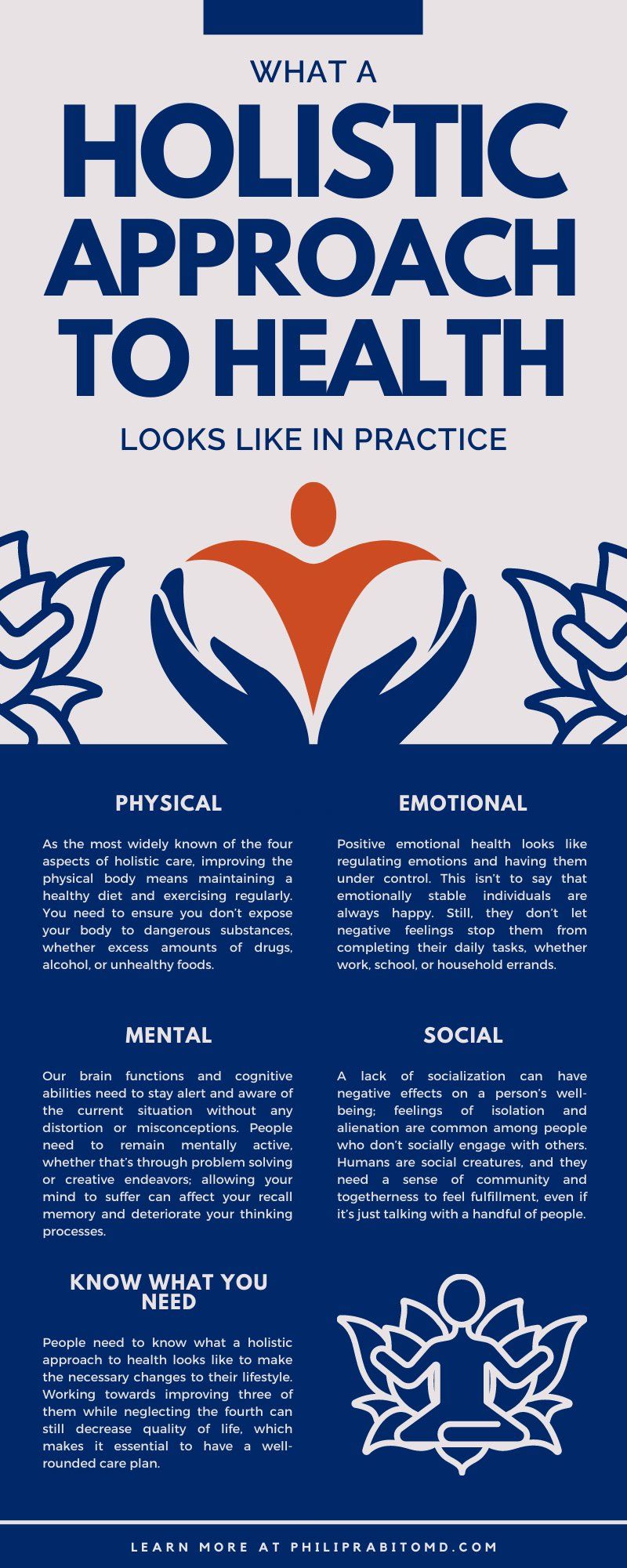
Individuals often think that living a healthy life entails maintaining only their physical health, but there are far more facets to living happy and healthy than that. People need to satisfy all their needs to ensure their continued health and overall quality of life.
Knowing what a holistic approach to health looks like in practice enables people to look at their daily routines and identify problem areas critically. Going beyond dieting and exercise, know what everyone needs to make sure they can maintain a healthy lifestyle.
The Basics of Holistic Health
Holistic health means taking care of every aspect of the body, and that includes a number of different factors; those factors include:
- Physical
- Emotional
- Social
- Mental
These are the four pillars of holistic health, and people need to consider and maintain each one to ensure they have everything they need to be healthy. Neglecting even one can have serious repercussions, whether it’s taking a toll on your health or decreasing your quality of life. Understand what each facet entails and what you can do to improve the parts to affect the whole.
Physical
As the most widely known of the five aspects of holistic care, improving the physical body means maintaining a healthy diet and exercising regularly. You need to ensure you don’t expose your body to dangerous substances, whether excess amounts of drugs, alcohol, or unhealthy foods.
Bad dieting mixed with harmful habits and a sedentary lifestyle can slow down and disrupt the body’s processes, having noticeable physical effects, such as difficulty breathing and moving.
Ways To Improve Physical Health
Maintaining physical health doesn’t have to mean spending every other day at the gym; it can be as easy as going out for a 15-minute walk. So long as people are active and break their sedentary habits, they can promote healthier bodies and living.
Besides dieting and working out, people can easily maintain their physical health by getting eight hours of sleep a night. The body must have the time to rest before the stress of the next day. Essentially, it’s the body’s way of recalibrating itself; despite the inactivity, the body needs this time to process nutrients and stabilize the processes of the organs.
Emotional
Emotional health is our sense of well-being and our ability to cope with past, present, and developing stress. Poor emotional health can manifest by individuals feeling overwhelmed by current circumstances.
Positive emotional health looks like regulating emotions and having them under control. This isn’t to say that emotionally stable individuals are always happy. Still, they don’t let negative feelings stop them from completing their daily tasks, whether work, school, or household errands.
Ways To Improve Emotional Health
Everyone responds to stress differently, but everyone needs to know ways to cope with and mitigate the effects of stress. This can mean identifying and compartmentalizing the triggers in your life, discovering why they make you feel negative, and applying strategies to manage that emotional instability.
It’s often difficult to manage these feelings on one’s own, which is why many turn to therapy to put them down the right path. Other methods include writing down your stressors; keeping a physical list can make them feel smaller and more manageable. Keeping a journal and venting your frustrations is also often an effective way to unleash your emotions productively.
Mental
Often associated with emotional health, mental well-being has many similarities but also stresses the need to have a clear mind. Our brain functions and cognitive abilities need to stay alert and aware of the current situation without any distortion or misconceptions. People need to remain mentally active, whether that’s through problem solving or creative endeavors; allowing your mind to suffer can affect your recall memory and deteriorate your thinking processes.
Ways To Improve Mental Health
Keep yourself active and engaged with problem-solving and consume nutrient-rich food; don’t underestimate the power a well-balanced diet has on mental functions. Individuals should also limit the use of drugs, alcohol, and other mind-altering substances.
Social
Life keeps everyone busy, and it’s easy to let work, school, or other obligations get in the way of socializing. But lack of socialization can have negative effects on a person’s well-being; feelings of isolation and alienation are common among people who don’t socially engage with others. Humans are social creatures, and they need a sense of community and togetherness to feel fulfillment, even if it’s just talking with a handful of people.
Ways To Improve Social Health
Always make an effort to spend time with friends and family, even when you feel physically tired or you don’t think you can chat for long. A little conversation goes a long way, and having a face-to-face talk with someone you care about is a quick remedy to isolation.
Alternatively, you can get involved with the community through charity work or public events. It’s a way to get you out of the home and socialize with new people under new circumstances. Casual conversation and making connections with new people help those who feel like an outsider in their community.
Know What You Need
People need to know what a holistic approach to health looks like to make the necessary changes to their lifestyle. Working towards improving three of them while neglecting the fourth can still decrease quality of life, which makes it essential to have a well-rounded care plan. Don’t underestimate the power that these factors can have on your experience; they can play a significant role in your enjoyment or difficulty through life.
Among the issues people face that severely impact their lives, endocrine disorders have a significant effect, damaging physical, emotional, mental, and social well-being. To have a holistic approach to your health and get your condition under control, you need a doctor capable of accounting for these considerations. Dr. Philip Rabito offers a personalized treatment plan based on your needs. As an endocrinologist on the Upper East Side, Dr. Rabito provides the care you need to ensure improved quality of life.


